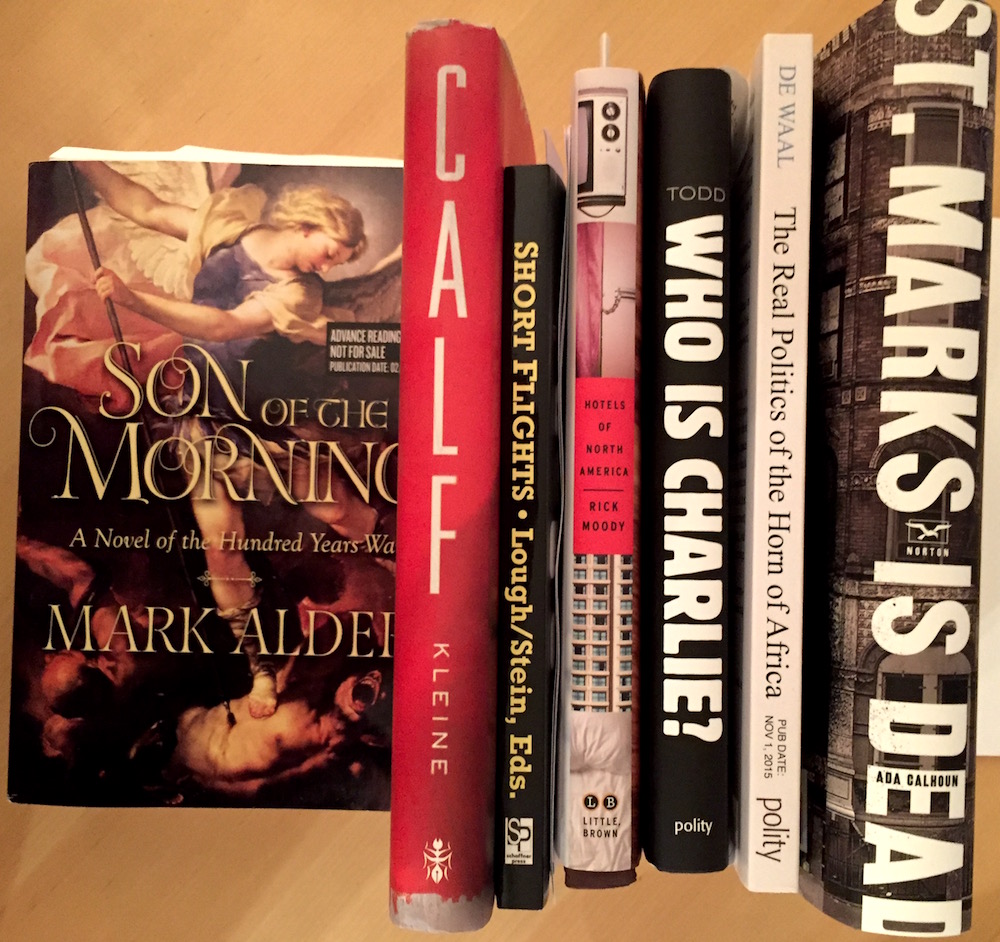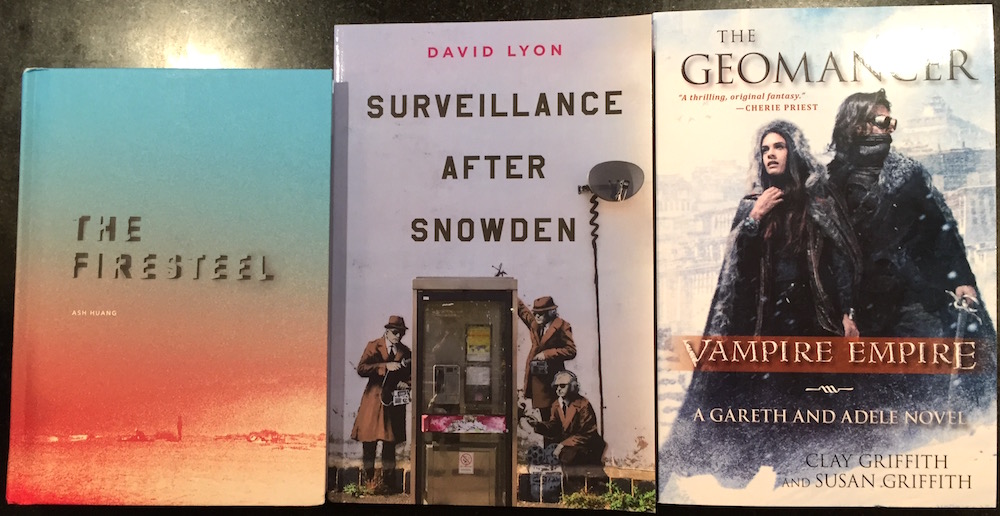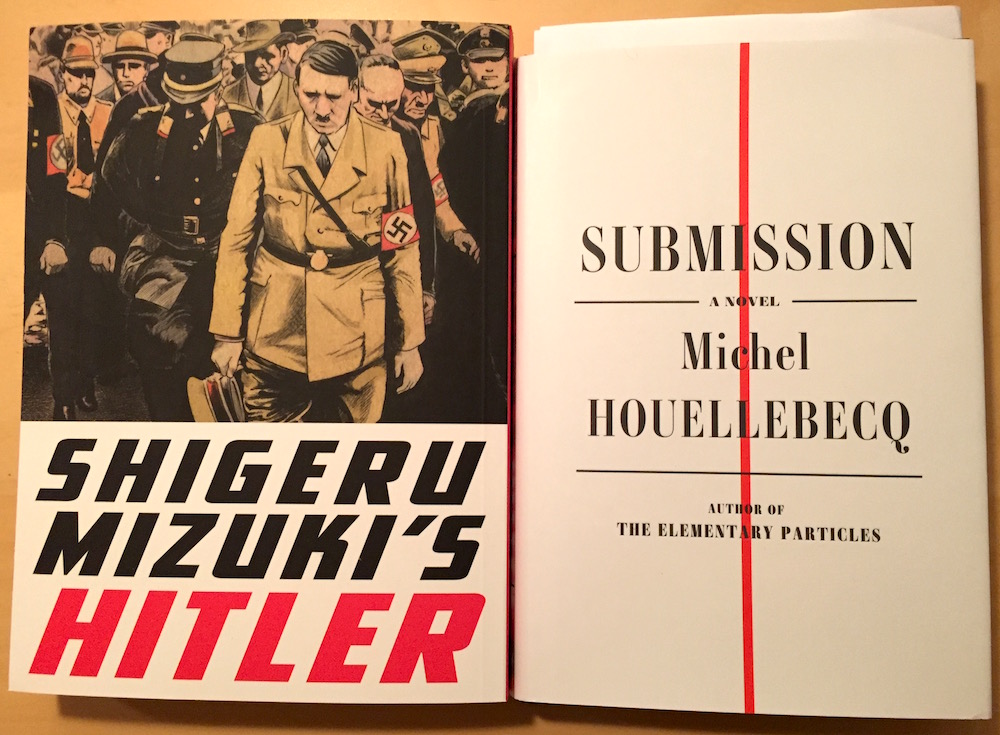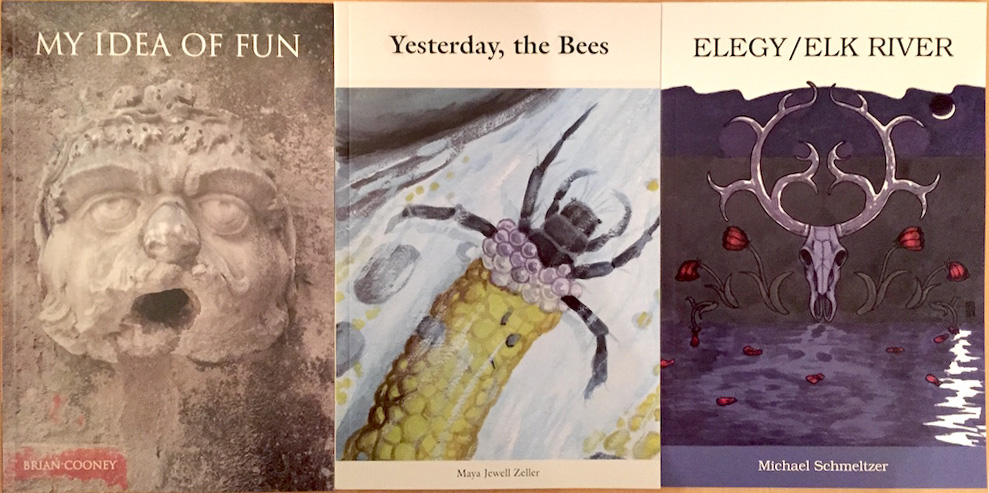Short Run: I second that
Published November 03, 2015, at 2:00pm
We already covered the Short Run Comix and Arts Festival once, but it was so much fun we had to do it again.
Voting is power: A conversation with Ari Berman about the struggle for voting rights in America
The Nation contributing writer Ari Berman’s excellent new book Give Us the Ballot tracks the history of voting rights in America from the 1950s to today. No less a civil rights giant than Congressman John Lewis calls Berman’s history a “must-read” that “should become a primer for every American” on the topic of voting equality. (Lewis, of course, figures heavily into Ballot’s narrative.) This Friday, Berman appears in conversation with Supreme Court Justice Steven Gonzalez at Town Hall to talk about the state of voting rights nationally and in Washington State.
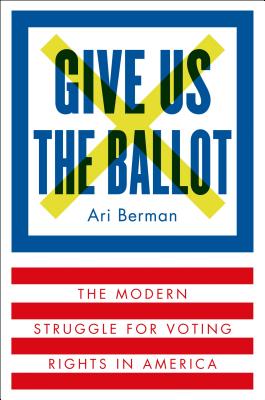
“I think turnout is always low for municipal elections, and I’m not sure that’s the best barometer” for a healthy democracy, he explains over the phone. Colorado’s vote-by-mail system is more successful, he says, because it provides many locations around the state where voters can drop off ballots, as opposed to Washington’s limited ballot drop locations. But he promotes one particular type of voting reform more than any other: “States that have same-day voter registration tend to have higher voter turnout. I think that, more than any other single reform, same-day registration has boosted voter turnout in a lot of places.” (Automatic voter registration has been discussed in Washington, but it doesn't appear to be moving forward.)
One of the main talking points that politicians use to discriminate against minorities at the polls is the idea of voter fraud. “I think that there’s a right-wing echo chamber that has sustained the voter fraud myth for a long time,” Berman says. That consistent push to promote fraud completely ignores the idea of “how rare it is,” he explains — “particularly voter impersonation,” which is the most-discussed type of fraud, but which is in reality “exceedingly rare.” How rare? “There have been a billion votes cast since 2001” Berman says, but only 31 cases of voter fraud.
We’ve seen very little positive movement on voting rights on a national level, but several states are experimenting with laws of their own. Local organizations are promoting the Washington Voting Rights Act, which is modeled on a successful California voter protection law. But that’s not enough. “The state’s voting rights acts are interesting constructs, but they’re no replacement for federal protection,” Berman warns. He understands the reason why they’re necessary—on a federal level, ”you not only have a hostile Congress but you have a hostile Supreme Court,” which requires states to take on the role of “laboratories of innovation.”
Ask Berman if he has any advice for people who haven’t yet voted today, and his answer will likely surprise you. Local elections, he says, matter a lot — local positions are how we get into government in the first place, and a voter rights act in Yakima might lead to the election of the city's first Latino candidate to the City Council today. But Berman says “I don’t want to rag on people who don’t vote in municipal elections because we have a lot of elections in this country—probably way too many.” Berman says the onslaught of mailers and phone calls and television ads never stops because we have elections every year. He believes that “at the very least every two years should be enough.”
Though he can certainly understand voter fatigue, Berman is a big believer in the importance of voting. When confronted by people who believe that their votes don’t matter, Berman replies, “if their vote didn’t change anything, then why try to restrict voting rights? Clearly, that’s a sign that voting does matter—that people have tried to restrict it throughout history.” Further, “if you don’t vote, it’s not like you’ve gained power. You have less power, you’ve ceded your power to someone else, and they’re going to have more power than you after that.” On a day when every single city council position in Seattle is being decided, the balance of power rests with the people. How you vote — or even if you vote — will determine where that power goes.
why a Cuban living in the NW isn’t going to write about rain or salmon
right off — there’s already enough rain
I’m not inviting it into my poetrysalmon—this fish whose body
torques up ladders —
has enough problemsif you’re Cuban
and wind up in the Pacific Northwest —
the ecstasy of your dreams is pocketed until August —
the only month of certain heatyou troll the Asian produce stands
for malanga, scotch bonnet peppers,
and the elusive green plantainyou wait months for the only Desi Arnaz CD in the Seattle Public Library’s holdings —
even though there aren’t any other holds
Looks like Amazon gave the Seattle Times the exclusive. Jay Greene reports:
At 9:30 Tuesday morning, the online retail giant will open will open [sic] its first-ever brick-and-mortar retail store in its 20-year life in University Village.
The store, called Amazon Books, looks a lot like bookstores that populate malls across the country. Its wood shelves are stocked with 5,000 to 6,000 titles, best-sellers as well as Amazon.com customer favorites.
We will of course go and investigate Amazon Books and report back soon. But in terms of quick takes: that's not a lot of titles for a bookstore to carry. Elliott Bay Book Company, for example, has 150,000 titles.
In this morning's post, I said there were way too many great events going on this week. I stand by that statement. Somehow, it escaped my attention that Seattle Arts and Lectures is hosting a Local Voices reading tomorrow night at Hugo House. No offense to Marion Nestle, who will undoubtedly put on a great reading at Town Hall tomorrow night and who is very knowledgeable about the scourge that is Big Soda, but the Local Voices reading should obviously have been the event of the night. I mean, look at this lineup:
Margot Case, Vicky Edmonds, Katy Ellis, Karen Finneyfrock, Kathleen Flenniken, Matt Gano, Rachel Kessler, Corinne Manning, Michael Overa and Ann Teplick.
So look. If you're not into poetry or fiction, you should attend the Nestle reading. You'll have a great time! But if you care about Seattle literature, obviously go to the Hugo House tomorrow night. I apologize for any confusion this oversight may have caused.
Twelve Saints is poetry and art in collaboration
Our thanks to this week's sponsor Entre Ríos Books. Their first release Twelve Saints is a beautifully done collaboration between poet Knox Gardner and artist Nia Michaels.
On our sponsor page, we're featuring the "Saint Catherine of Alexandria" with her matching image. It's a real treat, and we think you're going to love it.
They're throwing a book release party this Thursday — look at the sponsor page for more information.
Entre Ríos Books is part of the solution — they're partnering with us to make internet advertising 100% less terrible. You could get your work in front of our readers, too. We'd love to have you.
Short Run for the long haul
Published November 02, 2015, at 11:56am
The Short Run Comix and Arts Festival seems to get bigger every year. Has it kept its independent edge? What were some of the standout books? Paul Constant runs down some of his festival highlights.
Your Week in Readings: The best literary events from November 2nd - 8th
MONDAY Elliott Bay Book Company kicks off our week in readings with Calf, Andrea Kleine’s debut novel. Here’s an introductory note you’ll find before the first page of Calf:
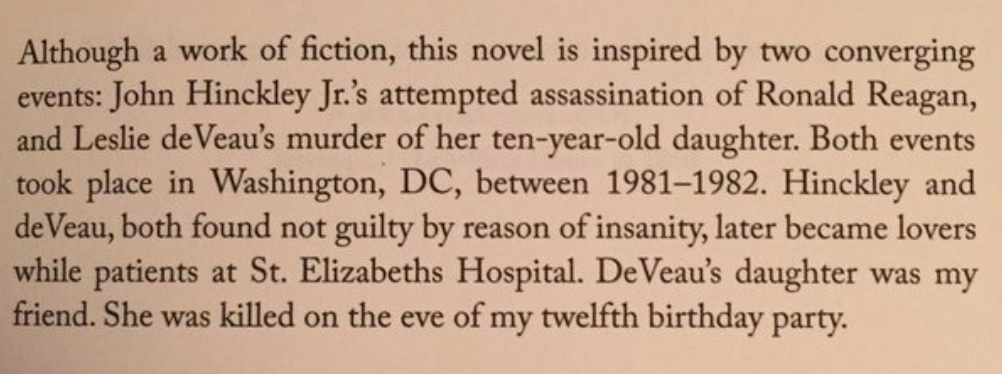
If that doesn't grab your attention, I don't know what will. Kleine will be appearing with delightful Seattle author Mattilda Bernstein Sycamore, who will read new work.
TUESDAY Marion Nestle, who is a nutrition expert, reads at Town Hall from her book Soda Politics. It’s about how the soda industry has willfully caused “increased rates of obesity, risk for Type 2 Diabetes, [and] poor dental health” in people all over the world. She also prescribes some solutions and highlights some anti-soda campaigns that have worked around the world.
WEDNESDAY Okay, it’s time for a programming note: this week is incredibly loaded down with great-looking events. I could highlight three or four events for every night this week — for instance, Sloane Crosley is reading at Elliott Bay Book Company tonight. But tonight at the Seattle Public Library, Orhan Pamuk will be reading from his newest book, A Strangeness in My Mind. Crosley is one of the funniest writers at work today, but Pamuk has won the Nobel Prize for Literature, so he obviously comes out on top.
THURSDAY At Hugo House it’s time for the last Cheap Wine and Poetry of the year. Your readers tonight are Poetry Northwest’s Kevin Craft, memoirist Nicole Hardy, self-professed “creative heartist” Nikkita Oliver, and the indomitable Ed Skoog. Wine, as always, is $1 a glass.
FRIDAY Remember what I said about every night of the week being overstuffed with events? The Carrie Brownstein and Maria Semple reading at The Neptune is very likely to have sold out by now, so let’s direct our attention to a smaller, very worthy event: at Left Bank Books, Vancouver poets Kevin Spenst and Jeff Steudel will read from their latest books. Spenst’s debut collection is riddled with pop culture and the landscape of Vancouver. It’s titled Jabbering with Bing Bong. Steudel’s Foreign Park is about the history and ecology of the Fraser River. It’s not every night you get to attend a reading at Left Bank Books; go celebrate one of Seattle's best bookstores.
SATURDAY Town Hall Scholar in residence Brangien Davis, who was until recently the arts and culture editor of Seattle magazine, will give a tour of Town Hall’s hidden gem, “an Austin Universal Air Chest, a 2023-pipe organ that was installed in 1923.” The organ hasn’t worked in a long time, but Davis will investigate the way it’s blended into the building, and she’ll talk about what it might take to bring the organ back to life.
SUNDAY At Benaroya Hall tonight, Gloria Steinem will present her new memoir, My Life on the Road. She will be interviewed by Cheryl Strayed, and Seattle singer/songwriter Hollis Wong-Wear will perform new music. This is obviously going to be a very special evening.
The Sunday Post for November 1, 2015
Amazon reviews hijacked by causes, conspiracies, rage
Amazon's reviews have long been an outlet for mocking humor, which the company has long tolerated. They're mostly harmless, and get people in the door and engaging on the platform. But Jay Greene at the Seattle Times looks at the darker of review activism.
Increasingly, though, people are launching coordinated campaigns to push political and social agendas through negative reviews often only tangentially related to the product for sale. They are able to do so because Amazon welcomes reviews regardless of whether the writer has actually purchased the product.
A Penny for Your Books
Some retailers have always worked on razor-thin margins, but it's amazing to look inside the world of discount online booksellsers -- like Auburn's own Thirft Books.
Despite the naysaying about the death of publishing, the industry’s most vital numbers — sales and revenue — aren’t actually all that gloomy. In 2014, publishers sold just over 2.7 billion books domestically, for a total net revenue of just under $28 billion, a larger profit than in the preceding two years, according to the Association of American Publishers. There were just over 300,000 new titles (including re-releases) published in the United States in 2013. The book industry may not be as strong as it once was, but it’s still enormous, and generates a considerable amount of surplus product each year.
Iris Murdoch, The Virtuoso Of Virtue
For as long as I'm penning the Sunday Post, Murdoch will be a commmon theme. There's a lot of interest in her works right now, as her letters are being collected and released. Here, Standpoint founding editor Daniel Johnson offers some remberences.
By the time I made her acquaintance in the 1980s, Iris had been a public figure for a generation. Her only rival as a philosopher-novelist had been Sartre, whom she had introduced to the Anglo-Saxon world. Having outlived and in many ways outshone him, she was a star of the first magnitude in the intellectual constellation of post-war Europe. Though she belonged to a brilliant generation of female philosophers — her “dearest girl” Philippa (“Pip”) Foot, her “friend-foe” Elizabeth Anscombe, and her friends Mary Midgley and Mary Warnock — all of whom made major contributions to academic and public life, Iris was the only philosopher of either sex among her contemporaries to become a truly national figure. She deserved her renown; her posthumous reputation as a writer and thinker has survived the scrutiny of biographers and critics. She never wrote an autobiography, but her letters reveal her introspective side, as she looks back over la vie antérieure and forward to new fields — and men — to conquer.
Rediscovering Angela Carter's poetry: Images that stick and splinter in the mind
Rosemary Hill looks at a newly released volume of Angela Carter's poetry.
“Unicorn”, like The Bloody Chamber, draws out what a post-Freudian age sees beneath the surface – the phallic unicorn’s horn, the virgin in the garden – draws it out, blows it up into imagery as lurid as a flashing neon sign outside a sex shop and then drops it bathetically flat at the end. This woodland’s “innocent and fragile leaves” conceal the strip-club agents who are using an unappealing virgin, “raw and huge … the only virgin to be had” to lure the unicorn. As Carter once said of Walter de la Mare, a writer she, surprisingly perhaps, much admired, these are images that stick like a splinter in the mind.
One day left to read some amazing, moving work
Our thanks to this week's sponsor Esther Altshul Helfgott. If you haven't had the chance to look through the excerpt from her book Dear Alzheimer's, you should do so now — it will only be up through tomorrow.
Helgott's journal of poetry and prose turned poignant when her husband Abe started feeling the effects of Alzheimer's. Her light touch, observational manner, and careful writing make this a moving journey. One full of life and discovery, despite the seriousness of the topic. I think you'll be glad you took the time to read the excerpt we posted this week.
We do things a bit differently around here. We have one sponsor a week, and they offer some of their work for you to read. You could do the same thing with your work, if you wanted. Find out more here. It's all part of our attempt to make internet advertising 100 percent less terrible.
Rahawa Haile’s short stories of the day, of the previous week, for October 31, 2015
Every day, friend of the SRoB Rahawa Haile tweets a short story. She gave us permission to collect them every week. She's archiving the entire project on Storify
Short Story of the Day #296
I went for a walk and brought you back mountains. My legs I left behind. pic.twitter.com/MWzPRR0enh
— Rahawa Haile (@RahawaHaile) October 25, 2015Short Story of the Day #296
Elaine Chiew's "Aquarium"
SmokeLong (2015)
https://t.co/M80XsvrcLq pic.twitter.com/DsPbsJ5Yaa
— Rahawa Haile (@RahawaHaile) October 26, 2015Short Story of the Day #298
Joy Williams's "Chicken Hill"
New Yorker (2015)
https://t.co/Uu0KTOUkD0 pic.twitter.com/dDsKF5mLuq
— Rahawa Haile (@RahawaHaile) October 27, 2015Short Story of the Day #299
Lesley Nneka Arimah "What It Means When a Man Falls From the Sky
https://t.co/PEOWntJ1rT pic.twitter.com/YYarQvfupi
— Rahawa Haile (@RahawaHaile) October 29, 2015Short Story of the Day #300
Happy to announce I've signed with a literary agent who found me through short story of the day! Yayyyyyyy! 🎉
— Rahawa Haile (@RahawaHaile) October 30, 2015Short Story of the Day #301
Ottessa Moshfegh's "I Spent Some Time"
Unsaid (2012) pic.twitter.com/Qr69OB2OJw
— Rahawa Haile (@RahawaHaile) October 30, 2015For 12 minutes tomorrow starting at 12:12 pm, you can take part in a Halloween poetry exorcism happening on Twitter. This is a collaborative poem what will perhaps result in something ghastly. Who or what is being exorcised from whom? Unclear! Presumably all will be revealed tomorrow.
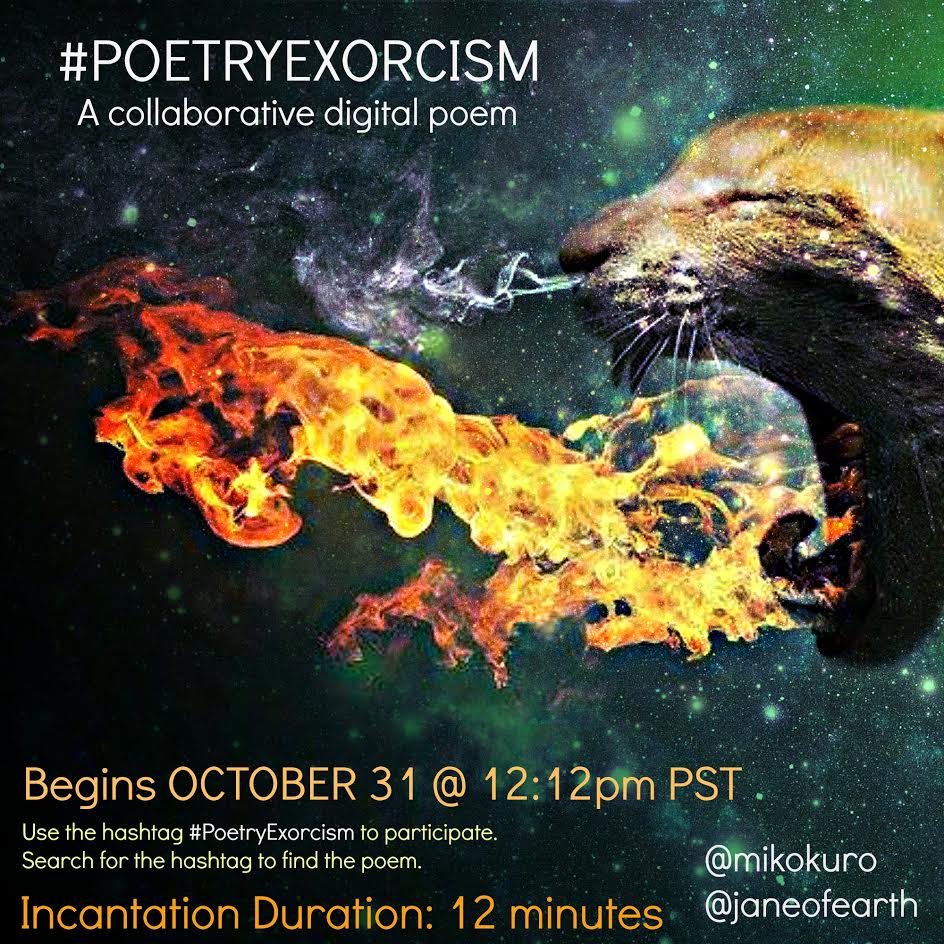
Follow the organizers of #PoetryExorcism on Twitter.
"Gay-romance novelist accused of plagiarizing straight-romance novelist." I mention this story in part because plagiarism is always fascinating — in part because it's always unnecessary. Why steal someone else's words when there are all these free words floating around our heads all day?
But this story is especially interesting: who was the person who reads both straight and gay romance who uncovered this plagiarism in the first place? I know they exist, and I think that's great, but what is the reading process like? Were they drawn to these books specifically because they sounded similar? What was it like, telling the alleged victim of plagiarism about your discovery? Will these questions ever be answered? I want this story to be a TV movie of the week so, so badly.
NaNoWriMo Week 1: Next month you write your novel
Sunday is November 1st, and that means across the world thousands of people will rush from the starting line, typing at the speed of story to get their 50,000 word novel done during NaNoWriMo. If you've ever wanted to write a novel, you should join them. It's a crazy, exhilarating kind of fun. In fact, we made a little tool to help you. Subscribe to the Twitter account @nanocount, and every day we'll give you a target word count guaranteed to get you over the finish line.
I've participated in NaNoWriMo seven times, and finished five of those. The first time was in 2003, and that experience showed me that I was capable of being a writer. It was a knowledge only earned from the doing, like a vital warmth that flushes the skin, then penetrates down to your core as you work through the month. It taught me, in the way that only writing can, how to be a novelist.
It also changed my experience of reading. I'm convinced that every engaged reader who has even the slightest desire should write a novel. Even if she has no serious intent to become a writer; even if the book never leaves the (probably virtual) drawer. Undertaking the process will give her such a rich understanding of what it takes to craft a work, that novels will seem, if anything, more miraculous than they do to her now.
Writing 50,000 is done in smaller chunks every day. A reasonably fast typist can turn out 1,700 words or so (what I recommend) in a few hours, working straight. If you are capable of doing that, you can set a good pace and finish the month in good form.
Work at the same time of day (some do better in the morning, some do better at night), if you can, and turn off the internet when you do. If you need to research something during your writing, use an old writer's trick and type TK in the text. Those two letters don't appear together in our language naturally, so they're easy to search and find later. Write something like "Of course, James, every schoolchild knows the Magna Carta was written in TK", and then come back to it later. Only after you've gotten your word count in, and a bit extra for luck.
Trust your subconscious and name your characters with the first thing that pops into your head. You can always change it later, so don't get hung up on picking names instead of actually writing words.
When you're done writing for the day, turn your internet back on and login to NaNoWriMo to enter your word count. Claim your credit for a job well done — that feeling of watching that number grow is a kind of pride that is hard to explain until you experience it.
What if you feel like you don't know anything about writing and are intimidated to start? I know that feeling. I'm going to cover a bit of writing theory 101, and then I'm going to give you some practical tips.
I used to attend a lot of writing classes. I was frustrated by them. Imagine a woodworking class where the instructor rolls in a pristine Colonial era highboy and says: "What you see in front of you is the most beautiful, simple, and expressive piece of woodworking and craftsmanship ever created. I would like you to start trying to build something this exciting. Here's some wood, and some tools. See how you do and we'll critique your work next week." And then off you go learning how to join wood before you've ever been taught how to wield a saw.
So it is that we go to classes to read masterful pieces of writing by the world's most prominent and experienced writers, without the context of how they learned, or what their terrible first drafts are like. We can't see how hard they worked, we only see the perfect sentences, and to some, that intimidation of quality, is the death of creative output (see that now-famous Ira Glass quote to understand this better).
But stories, like woodworking, have a 101. Master crafters, like master woodworkers, know how to cheat, break, and bend guidelines, but they all started by learning about grain. I found teachers, eventually, who taught these basics to me, although many writers figure them out on their own through doing.
Here are some base fundamentals that you can follow to create a readable novel.
- Stories are about someone (a protagonist) who wants something and is unable to get it. You may not know what that ultimate thing is at first, but you should know what the protagonist wants right now in the story.
- Stories are made up of scenes. If story is a loaf of bread, scenes are the slices. In the scene, the protagonist tries to get what they want by walking a path straight towards it, and somebody else (the antagonist) opposes them and knocks them onto another path. The gap between those two paths is where the narrative tension lays: the protagonist wants to be on that other path. Now they have to both get back to the first path, and then go after what they want.
- Scenes should change something. They should start good and go to bad, or start bad and go to good. Don't let your characters live in a scene where nothing has happened. The writing will be flat and nobody will want to know what happens next.
- Imagine scenes happening in real time, not flashback (there's only one way to do flashbacks properly), and in the world of the story, imagine a scene only capturing five minutes or so of elapsed story time.
- Your characters should be active. They should be doing things, they should be going places. Describe their setting, and then give them action.
- Let one scene tell you what will happen in the next. You do not need to know where your book will go when you start to write it. Just trust that you will figure it out when you need to, and worry only if the thing you are working on right now makes sense in relation to the thing that came before it. Work the link and attach it to the previous one, and soon you have a chain.
- As your protagonist changes, the thing they want may change too. Dorothea, in Middlemarch, only wanted Edward Casaubon until she got him. Then she changed, and didn't want him anymore because of what she learned about herself. Let your character's desire, and your antagonist's action, drive the story.
- As you put scene after scene, things will build, and the path forward will feel more inevitable.
- You will know when you reach the end. In the case of NaNoWriMo, it will be 50,000 words after you started. You will see a moment where the walls start converging, and it just makes sense. You'll start running towards that closure, and it will be like the end of a long race, with exhilaration, and exhaustion, and excitement.
- You can do this. Many people have written novels. Worse writers than you have written novels. You can do this, and if you want to at all, you should.
Here's the secret of the flashback. I learned it from Maria Semple during a Hugo House class, and she learned it from a writer in LA. When you are doing a flashback, the character must first be in the moment of the scene, and then be reminded of something in the past. Maybe she smells something that evokes a memory. Go into the past, into that memory, and treat it like a scene. Stay there as long as you need, but when you return — and here's the key — no time has passed for your character. She's just come out of her daze, smelling that perfume, and that moment of memory is now gone and we are back in the moment. That memory can now inform her present, which is where the reader prefers to be.
What if you don't know where to start? Start by telling a short story that happened to you. John Irving once said that every novel of his starts as his autobiography, but then he starts lying.
What is that story about your past, about a first date, or about your (possibly literally) crazy Aunt, or the person who did you a kindness when you were in your most need? What about that angry man in public, or that broken person in need of help that you saw get that help? Or the broken person in need of help that didn't get it?
Or, what about that time you had to carry this ring to a mountain, or break an intergalactic trade hegemony, or were reporting on a Seattle City Library board meeting when the lizard people from the center of the earth came to steal our books for their nutritious glue?
Start telling that story. Start in the moment. Describe where your character is. Describe what they do more than what they think. Type like mad. You've got 1,700 words to get through on Sunday, and we're so excited to see what you dream up.
The Help Desk: Is it okay to lie about books?
Every Friday, Cienna Madrid offers solutions to life’s most vexing literary problems. Do you need a book recommendation to send your worst cousin on her birthday? Is it okay to read erotica on public transit? Cienna can help. Send your questions to advice@seattlereviewofbooks.com.
Dear Cienna,
I have a nasty secret. I really like to pretend I've read books that I've never actually read. Sometimes I'll be at a party and someone will start talking to me about — here's a recent example — Gore Vidal. I've never read Gore Vidal, but I enthusiastically lied and said that I had, that I enjoyed many of his books. But it's not just the lie; I like to get really risky with my book chat. I'll sometimes string along the conversation, becoming more and more specific in my commentary. I said, for instance, that the dialogue in Gore Vidal's novels are often wooden. Is his dialogue wooden? I don't know. But the person at the party believed me.
I'm pretty honest otherwise, and I read a substantial book or two a month. I'm fairly well-read, but I will leap at the chance to tell lies about books I've never read. Is this a cardinal sin? Am I going to wind up in some literary circle of hell, where Gore Vidal and J.G. Ballard and Gertrude Stein shove fondue forks into my haunches while reading their collected works aloud?
Beverly, White Center
Dear Beverly,
That is not a nasty secret — a nasty secret is the tattoo I have on my left buttock of a fist punching a baby with the word 'YOLO' inscribed under it. What you seem like is a lot of fun to have at parties. Lying about books is the most harmless form of lying I can think of and makes conversing with hordes of drunk strangers in enclosed spaces sound almost appealing.
I mean, what else are you going to talk about? Politics? The weather? The politics of weather, which is a stupidly fraught topic thanks to climate change deniers, who can often pass as sane people at first glance? Personally, I'd rather take a cheese grater to my nipples than get trapped talking about any of those subjects.
If there is a circle of Hell reserved for people like you, it certainly must be the most fun circle of Hell — the kind populated with people who eat raw cookie dough straight from the bowl and women with tattoos of a fist punching a baby with the word 'YOLO' inscribed under it.
Just be careful and know your audience. There are some people it's never a good idea to deceive for your own amusement. For instance, spiders. They have six eyes and at least four of them can detect lies.
Kisses,
Cienna
Tomorrow, the Short Run Comix & Arts Festival will be happening at the Fisher Pavillion at Seattle Center from 11 am to 6 pm. If you're looking for a ridiculously long list of all the exhibitors at the show, you can find that here. But the best way to go to Short Run is to not have a plan. Bring some cash and walk around. If you see something you like, buy it. I know it's super-scary, but try talking to strangers.
If you do insist on making plans beforehand, you might be interested in the short interviews we've been running with Short Run exhibitors all week long. Here they are in one handy list:
- Casandra Lopez of As/Us magazine will be presenting some new work, as well as back issues of her wonderful magazine.
- Check out Josh Simmons's horror comics.
- The art collective Fictilis will be running a Short Run Census Bureau that might be very helpful for first-time visitors to the festival.
- Krish Raghav is the first Dash grant winner in Short Run history. This is his first-ever show, and he's debuting a new comic travelogue of Mexico.
But this is just a tiny portion of the dozens of exhibitors who will be at this festival. You owe it to yourself to show up and wander around and see what you can find. I'll be walking the floor tomorrow, trying to track down the next big local comics phenomenon. I hope to see you out there.
The problem of applause
A few weeks ago, Facebook made news with some gossip that the site was trying to find a more nuanced way to respond to posts than simply “Liking” everything. The thinking, supposedly, was that it is inappropriate to “Like” a post announcing a loved one’s death, and people would prefer some other wordless way to show support. This was presented in the media as a novel problem, one created by the relatively new innovation that is Facebook.
But this is not a new problem; it’s simply a very old problem that has migrated to the new-ish realm of social networking. Case in point: the problem of applause. Applause is a blunt instrument which demonstrates, usually, approval. But it’s relatively lacking in nuance.
Tonight, Seattle Arts and Lectures brought Ta-Nehisi Coates to McCaw Hall. The sold-out room applauded a lot. And for good reason! Coates is as intelligent and honest and formidable in person as he is on the page. But when Coates tells a majority-white opera house packed with nearly three thousand people that he can’t tell white people how they should address racism — that “I’m not here to hold white people accountable,” that “only white people can hold white people accountable,” and this is the “burden” that only white people can bear — and when the room responds with resounding applause, well. That’s a complicated round of applause to parse.
Were they applauding Coates’s incisive thinking and bravery in stating the issue plainly without sweetening it through platitudes first? Or were they applauding their own willingness to bear the burden? Was it applause for the fact that Coates chose not to tell white people what to do? That applause could have come from any direction. You have to assume it was well-intentioned, but really it was just as vague as a blocky thumbs-up icon on the news that your aunt Geraldine died peacefully in her sleep of a heart attack. Really, it could have gone any way.
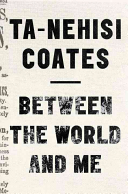
The conversation reached across a wide array of topics, from the 2016 presidential campaign (“Nothing is happening. You just think something is happening…I’ll probably start watching in January,” although Coates admitted that it is “deeply painful to watch Ben Carson,” who has been presented as a role model to young black kids for decades now) to Toni Morrison’s famous claims that Bill Clinton was America’s first black president (“She was not complimenting Bill Clinton…the treatment he endured was very familiar to black people.”)
Conversation kept mostly to race in America. Coates referred to America’s “peculiar” need to “be clean” and “innocent” in all things, but especially when it comes to race. He resisted any efforts to contextualize himself as someone with any special understanding or power on the topic. He insisted, again and again, on identifying himself as just a writer. When asked about his piece about reparations, he replied with some amount of pride that he “tried to write the hell out of that piece,” but when Phillips asked him if the piece accomplished what he intended to do, he became modest again: “it was published, so it did what I intended it to do,” he said.
The audience questions were of roughly the same quality you’ll find at any Seattle reading: a few great ones, a few clueless ones, and one or two that were more of a statement than a question. When asked if he had any “solutions” on the topic of race in America, Coates again stepped back and pointed out that he’s “just” a writer. “I love Joan Didion,” he said, but “there are no solutions to death. I like to stay in my lane. I’m not an activist. I’m not a black leader.”
Coates was asked his opinion of the video of a young black woman being tossed around by a police officer in a South Carolina classroom, and if he thinks we’re becoming numb to violence. To the latter question, he replied with a single word: “becoming?” As to the first, he asked “why was the officer in the classroom” in the first place? It’s because in South Carolina, “disrupting class is a crime,” especially if you’re black.
At the end of the evening, Phillips asked about the news that Coates was writing a Black Panther series for Marvel Comics. “How’s life in [the Black Panther’s fictional home nation of] Wakanda?” Coates was coy: “I probably shouldn’t tell you much about life in Wakanda.” He talked more broadly, instead, about his childhood love of Marvel Comics. “The X-Men would save the world, and people would try to kill them,” Coates said. “It seemed so familiar.” And he spoke adoringly of the medium of comics in general. As a comics reader, “you have to use your imagination to connect the panels. That is a beautiful, beautiful thing. That’s gorgeous.”
At the end of the talk, people walked out into the evening, talking about race. I heard one white woman trying to explain to her partner why she was so moved by Coates’s suggestion that if you were to somehow create true racial equality in America, that white people “would have nothing.” A silver-haired white man told his wife he had never thought so much about race as he had in this one evening. I wanted to applaud him for making that statement, but even I wasn’t sure what that applause would mean. Was I happy he admitted that he's never really thought about race before? Did I want to encourage him for finally thinking about race? Did I want to toss sarcastic praise his way? It’s complicated.
Next week could be yours
We have an opening for a sponsor next week. We'd love it to be you. We've had record traffic with our library coverage — you could reach out to that crowd to tell them about your book or event. People are starting to rely on the Seattle Review of Books for literary coverage; your sponsorship would help make that possible.
How's the sponsorship model going so far? Really well! Out of 27 original weeks we opened in this block of availability, only 5 are left. We're ecstatic about this. We'd love to see that number go down and down, and maybe with your help we can.
Like we say every week, help us to make internet advertising 100 percent less terrible, and we promise that we’ll make sure the sponsorships we show you are quality works that are interesting to you.
Portrait Gallery: Harriet Angeline Powers
Each week, Christine Larsen creates a portrait of a new author for us. Have any favorites you’d love to see immortalized? Let us know
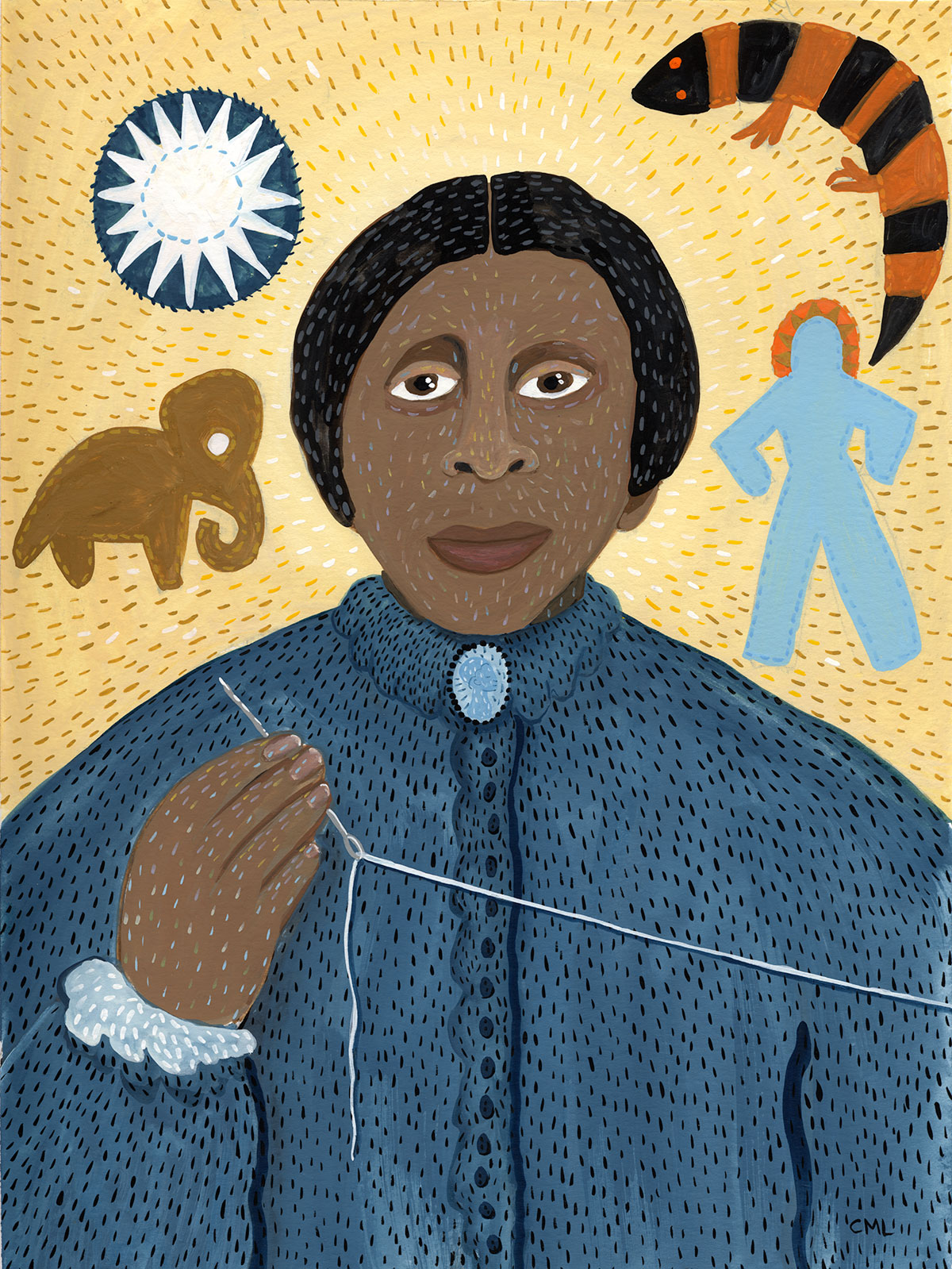
Today's the birthday of American folk-artist and quilter Harriet Angeline Powers, born October 29, 1837, the "mother of African-American quilting." Her story quilts depict bible stories and astronomical events in striking graphic panels. Two quilts have survived and are on display at the Smithsonian and the Museum of Fine Arts, Boston:
- Bible Quilt 1885-1886 (Smithsonian Institute American History Collection)
- Pictorial Quilt 1895-1898 (Museum of Fine Arts, Boston)
Books:
- This I Accomplish: Harriet Powers' Bible Quilt and Other Pieces, by Kyra E. Hicks
- Stitching Stars: The Story Quilts of Harriet Powers, by Mary E. Lyons
